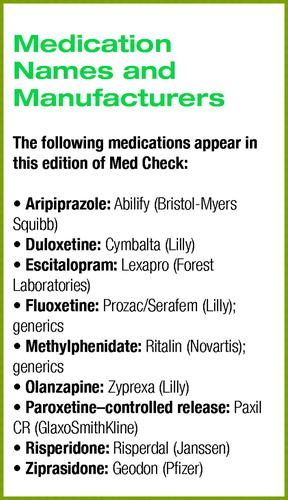Med Check
Regulatory and Legal Briefs

Research Briefs
Methylphenidate may be linked to an increased risk of cytogenetic abnormalities in children at commonly used doses. In a small study of 12 children (average age 8.2 years) treated with therapeutic doses (20mg/day to 54mg/day) of methylphenidate, researchers examined three cytogenetic endpoints in peripheral blood lymphocytes, obtained before and three months after initiation of drug therapy. In all 12 children, treatment was associated with significantly increased frequencies of chromosome aberrations (three-fold increase), sister chromatid exchanges (4.3-fold increase), and micronuclei (2.4-fold increase). Although no association between methylphenidate and increased cancer has been noted in the nearly 50 years the drug has been marketed, the study's authors said the findings “warrant further investigations... especially in view of the well-documented relationship between elevated frequencies of chromosome abnormalities and increased cancer risk.” They acknowledged, however, that one small study is not a reason to stop treatment in children who are otherwise responding well. Cancer Lett 2005. The article can be accessed online ahead of print at<www.sciencedirect.com/science/journal/03043835> by clicking on “Articles in Press” and then entering the term“ methylphenidate” in the “Quick Search” box. | |||||
Ziprasidone is not associated with the adverse metabolic changes or weight gain observed in some patients taking olanzapine. A retrospective chart review of 191 patients showed no significant differences in QTc interval in patients taking either antipsychotic drug. Significant weight gain was observed in olanzapine-treated patients, while those taking ziprasidone experienced weight loss. Adverse changes were seen in total cholesterol, triglycerides, and hemoglobin (Hb)A1C in patients taking olanzapine compared with favorable changes in total cholesterol, low-density lipoprotein, high-density lipoprotein, and HbA1C in patients taking ziprasidone. Int Clin Psychopharmacol 2005; 20:105-112 | |||||
Risperidone can significantly and persistently improve symptoms of tardive dyskinesia (TD) associated with typical antipsychotics. A new study followed 40 patients with chronic schizophrenia and severe TD who were switched to risperidone therapy for 48 weeks. The average total Abnormal Involuntary Movement Scale (AIMS) score decreased from 15.7 at baseline to 10.6 at week 48 with an average dose of risperidone of 3.6 mg a day. Twenty-three patients (57.5 percent) were responders, with a greater than 50 percent reduction in their AIMS scores and an average AIMS score decrease of 8.0 points. Significant improvement in TD symptoms was seen as early as week eight and persisted through week 48. Int Clin Psychopharmacol 2005; 20:79-85 | |||||
Fluoxetine appears to have limited efficacy in treating dysthymia in elderly patients. A randomized, double-blind, placebo-controlled trial of 90 patients (aged 60 and older) revealed that scores on the Hamilton Depression Rating Scale (Ham-D) and the Cornell Dysthymia Rating Scale (CDRS) showed a treatment-by-time effect that favored fluoxetine over placebo. However, the percentage change in Ham-D scores was not significantly different between those on fluoxetine and those on placebo. Percentage changes in CDRS scores were significantly better in those on active drug compared with placebo; however, response rates were not significantly different (27.3 percent response for fluoxetine versus 19.6 percent for placebo). Am J Geriatr Psychiatry 2005; 13:59-68 | |||||
Industry Briefs
Shire Pharmaceuticals Group and New River Pharmaceuticals Inc. announced an agreement for the global commercialization of New River's NRP104, a novel compound developed for the treatment of ADHD. NRP104 is a prodrug of amphetamine—that is, it is an amphetamine conjugated to a specific amino acid. By conjugating the pair, NRP104 is intended to provide better overdose protection and reduced potential for addiction, compared with currently marketed stimulants. A preliminary review by the U.S. Drug Enforcement Administration last year indicated that.the agency did not consider NRP104 to be an amphetamine, and thus it is not subject to controlled-substance scheduling. | |||||
Under their agreement, the two companies will collaborate on the continued phase III development, manufacturing, and eventual marketing of the drug in the United States. Shire has a license to develop and commercialize the product in the rest of the world. ▪



